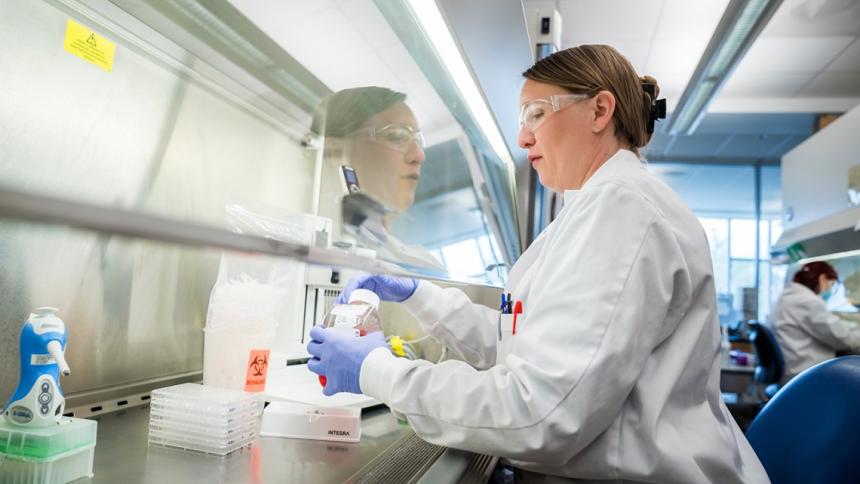In the News

April 19, 2024
Cornell virology experts are sequencing the bird flu virus that recently affected cows in Texas, after work at Cornell and two other veterinary diagnostic laboratories found the highly pathogenic avian influenza (HPAI) virus in cattle samples, a first for this species.

April 17, 2024
Cornell Lab of Ornithology staff have been working with wildlife veterinarians at Cornell’s Janet L. Swanson Wildlife Hospital to monitor Big Red, the beloved matriarch of the Red-Tailed Hawk Cam. Big Red appears to have sustained an unknown injury to her right foot.

Blog
April 15, 2024
My role within the lab is a complex balancing act of time management, project and sample organization, and managing our case data stream. I guide incoming diagnostic case submissions, manage research project samples and submissions, and help facilitate educational activities like wet labs and symposiums....

Video
April 12, 2024
In this eCornell keynote presentation, Dr. Martin Gilbert, Helen Lee, and Laura Bernert from the Cornell K. Lisa Yang Center for Wildlife Health share their fieldwork experiences in Asia and help illustrate how the health of wildlife and our own health and well-being are inextricably linked.

April 11, 2024
Santa Barbara is widely regarded as one of the most breathtaking coastal cities within the state of California. Home to perfect weather, beautiful beaches, five-star restaurants, and lively bars, it’s pretty safe to assume that I had a “wild” time and partied it up in this amazing city during the ten weeks I spent living there. Well, not exactly. Instead, I had a “wild” time treating wildlife at the Santa Barbara Wildlife Care Network (SBWCN) as a veterinary extern....
April 04, 2024
Dr. Marta Castelhano, director of the Cornell Veterinary Biobank, received the 2024 Outstanding Achievement in Biobanking Award from the International Society for Biological and Environmental Repositories.

March 29, 2024
An international team led by Cornell's Dr. Raina Plowright has proposed a roadmap for how to prevent the next pandemic by conserving natural areas and promoting biodiversity.
Video
March 20, 2024
Cornell postdoctoral researcher Dr. Maggie Swift recently presented at the Savanna Science Network Meeting in Kruger National Park, South Africa on forecasting savanna elephant movements using agent-based modeling.
Video
March 18, 2024
Johns Hopkins Science Diplomacy Coordinator and Cornell alum Isabel Jimenez, DVM '21, speaks with Professor Steve Osofsky about his career in conservation and how up-and-coming applied scientists can enhance their chances of translating their work into real change for good.

Blog
March 15, 2024
I had never heard of Santa Catarina — an island in one of the most southern states of Brazil. It is known colloquially as Ilha da Magia (magic island) for its incredible beauty and folklore passed down by the native Manezinho people....
